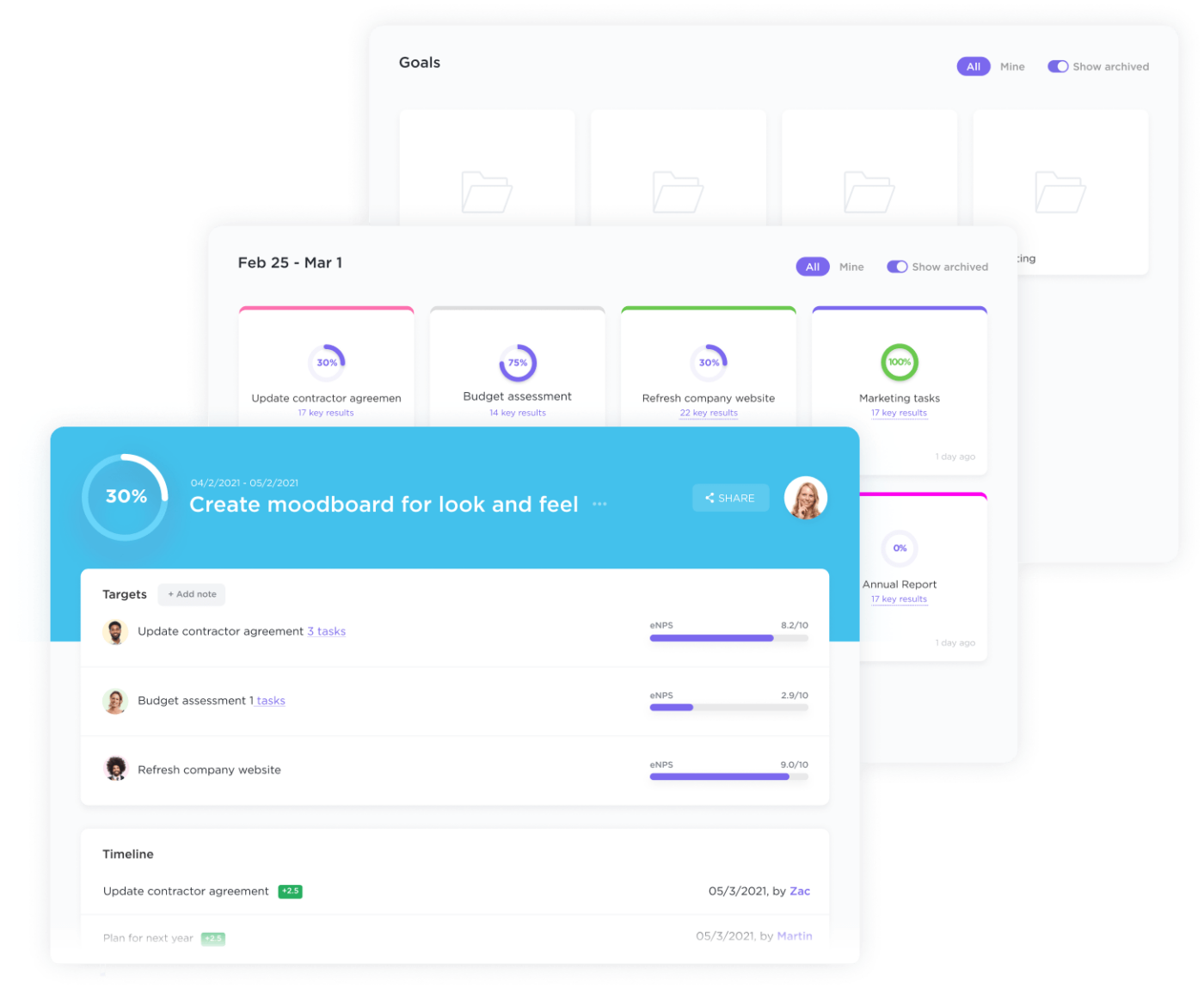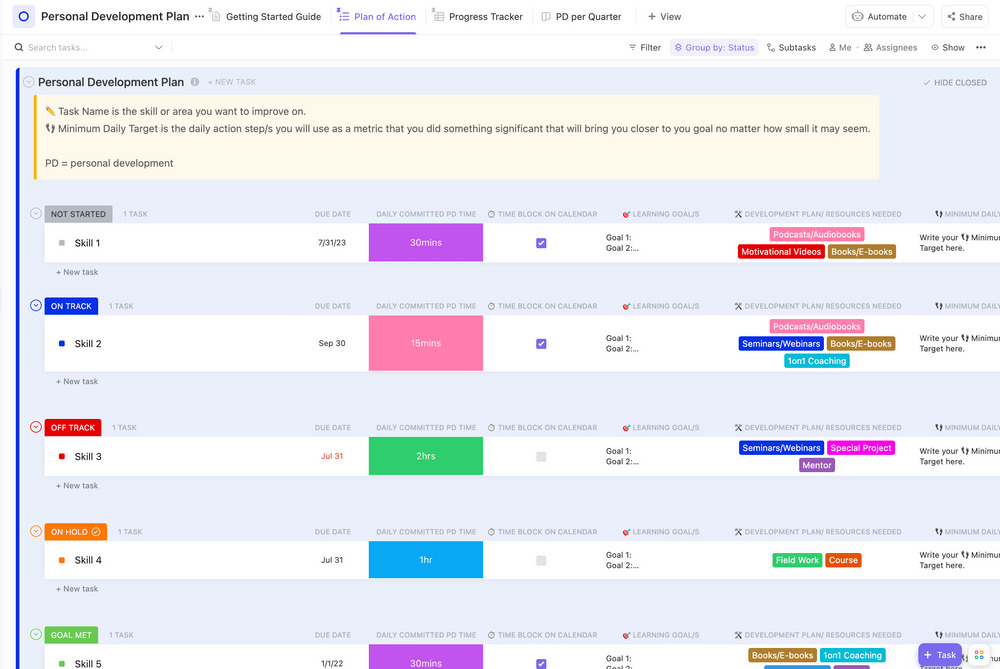College is an exciting time and amazing opportunity, and there are many aspects of college life to look forward to! From extracurricular activities, social events, and campus culture to internships, volunteer opportunities, and research projects—the world is your oyster. 😌👌
But all of those things can also become a little overwhelming: your class schedule, academic goals, campus life, and of course, your future career to think about. That’s why it’s important to set goals–not just any goals, but SMART goals.
Studies have shown that many college students fail to accomplish their goals due to a lack of planning. Don’t let that happen to you. Start planning your goals the SMART way.
In this post, we’ll give you a crash course on SMART goals and how to use them to make the most of your college education, groom you for graduation day, and help you prepare for your dream job!
⏰ 60-Second Summary
Setting goals is important because it provides direction and motivation, helping you stay focused on your academic journey and achieve desired outcomes.
- Use a goal-setting app and templates to keep track of your SMART goals
- Create an organized class schedule and show up to class
- Don’t just take any notes—take effective notes in class
- Block out time for studying each day
- Maintain accountability and a strong GPA
- Collaborate with classmates and professors
- Practice soft and hard skills
- Improve budget management skills
- Start planning career goals
- Sign up for volunteer work or internships
- What Are SMART Goals for College Students?
- Why is Setting Collegiate Goals Important?
- How to Reach your Academic Goals (Tips and Examples)
- 1. Goal-setting app and templates
- 2. Organized class schedule and attendace
- 3. Effective note-taking
- 4. Start time blocking
- 5. Maintain accountability and a strong GPA
- 6. Collaborate with classmates and professors
- 7. Practice soft and hard skills
- 8. Improve budget management skills
- 9. Start planning career goals
- 10. Sign up for volunteer work or internships
- The SMART Way to Set and Achieve Your Academic Goals
What Are SMART Goals for College Students?
It’s clear why we set goals—to get us to our desired outcome.
However, it’s not always clear how to start or how to get there.
This is where SMART goals come in.
Using the SMART goal framework gives your college goals a timeline and specific targets to help you create a realistic game plan and a roadmap to success. It’s also effective because it forces you to set measurable goals to help you track your progress.
So what does the acronym SMART stand for? Here you go:

Specific
Get in the habit of making specific college goals and note what exactly you’re aiming for, who’s responsible for it, what action items are needed, etc. The more granular you are with your goal, the easier it will be for you to work on it.
Measurable
Set quantifiable goals to help you keep track of your progress and give you an idea of what to adjust in your strategy or pace to get you on track to hit your goal.
Achievable
Understand where you currently stand regarding your overall goal, and create one that’s attainable but challenging nevertheless because, without a good challenge, there’s no growth.
Relevant
Set academic goals that are relevant to your career or education, and make sure your goal is connected to your overarching goals. This way, each step you take will lead you toward your goal and help you progress in the right direction.
Time-bound
Every goal should have a deadline. Assigning a due date for each goal can create a sense of urgency and help you prioritize effectively.
It’s never too early or too late to use the SMART goal-setting method. Start practicing it now to break your goals down into manageable steps and achieve them with less stress.
Why is Setting Collegiate Goals Important?
As a college student, you’re most likely juggling different parts of your life all at the same time. Everything from prerequisites to writing papers to getting ready to enter the workforce—it’s definitely a lot to manage.
This is exactly why setting college goals is necessary. And learning how to reach them is even more important.
Setting collegiate goals is an effective way to create an overarching vision, and specific action plans to make it all happen.
Additionally, your goals will help you stay focused on what you want and what matters and avoid committing to other things that don’t serve you and your goals.
So, to help you start on the right foot, you can use a project management tool with a goal-setting and tracking feature to manage your schoolwork, projects, and more and keep track of your goals—all in one place.

So whether you’re a high school student trying to get into college, a current college student looking for an effective way to manage your goals, or a graduate student working on your capstone project, use these tips and examples to help you create your own SMART goals!
How to Reach your Academic Goals (Tips and Examples)
1. Use a goal-setting app and templates to keep track of your SMART goals
It’s time to dive into what your SMART goals should look like.
Let’s say your professor assigned you a 12-page academic paper on a given topic with multiple sections to cover, and it’s due at the end of the second semester of school, which is usually 15 weeks for most colleges.
And because it takes a lot of time and effort to write a well-written report, you’ll need to break it down into smaller chunks to help you focus one section at a time (and avoid feeling overwhelmed and…procrastinating). 👀
SMART goal example
Here’s an example of an effective SMART goal to reach your goal of writing a well-researched paper and completing it on time:
I will complete one section each week for 12 weeks, then dedicate week 13 and 14 to editing my paper to complete my paper by week 15 (or insert due date).
Pro tip
Now that you have a SMART game plan, you’ll also need a progress-tracking system.
To help you with that, ClickUp offers a free SMART Goals Template to help you create an organized list of your weekly goals, add important details to each task, such as due dates, and more.

And because ClickUp is completely customizable, you can configure the platform to fit your needs and support your unique goals.
Create your own Custom Status to give every stage a designated name and make it easier for you to track your progress, add Custom Fields to personalize your view, and so much more.
2. Create an organized class schedule and show up to class
Managing both personal and school schedules can feel like a test itself for most college students. You’re in charge of showing up, doing the work, and keeping up with life’s demands all at once. This could lead to burning out if you don’t have an organized plan and schedule!
Stay on top of your calendar and ace your way through school by creating a monthly schedule that clearly shows all the tasks, projects, class sessions, and whatever else is on your plate for the month.
SMART goal example
Every 4th week of the month, I will create a monthly calendar that outlines my classes, deadlines, and important activities for the upcoming month.
Pro tip
Use this free Monthly Schedule Template by ClickUp to help you create an organized monthly schedule and foresee upcoming classes or important activities to prevent accidentally forgetting about them or showing up to class unprepared for a pop quiz. 👀

3. Don’t just take any notes—take effective notes in class
It’s always a good idea to take notes during class lectures, especially when learning something new or complex. College students must learn how to create functional and organized notes to enhance their learning and help them retain information.
SMART goal example
I will take notes in each class and review them at the end of each school day to help me retain the information.
Pro tip
Improve your note-taking skills by learning effective strategies that work best with your learning style and using note-taking apps.
Quickly jot down notes on a Notepad or use the ClickUp Docs feature to create detailed and beautifully outlined notes. These features are great for note-taking because of their rich-formatting features, which let you change fonts, add colorful banners to highlight important notes, add nested pages to keep your notes organized, and so much more.
You can also use the free Ultimate Guide to Using ClickUp Docs to give you a step-by-step guide on using the styling options to create well-organized and formatted notes.

Best of all, ClickUp is available on the mobile app—take your notes wherever you go, and jot down new notes directly on your smartphone or device. (Just let your professors know you’re taking notes—not playing around with your phone in class. 😉)
4. Block out time for studying each day
As a college student, chances are you’re always busy trying to juggle schoolwork and life outside of school. This makes a great time to learn how to improve your time management skills—an important soft skill you’ll need to master in life!
Bonus: Life planning templates!
SMART goal example
I will dedicate and block out three hours a day to studying and schoolwork.
Pro tip
Get better at managing your hectic schedule by time blocking and tracking time spent on tasks.
Start blocking time dedicated to studying or working on completing your schoolwork to allocate uninterrupted time to get your work done. Allocating time will help you prioritize your time more effectively and create healthy work habits that’ll stay with you beyond your years in school.
You can also use this Class Schedule and Time Study Template by ClickUp to give you a framework to start with. It’s free to download and comes with a Start Here Doc to guide you as you create your class schedule and study time calendar.

5. Maintain accountability and a strong GPA
A strong GPA indicates that you’re getting good grades and excelling in your classes.
College and high school students need to maintain a high GPA to show competency in school and to help earn academic honors and scholarships. Moreover, it makes you more competitive in the job market and increases your chances of getting into graduate school.
SMART goal example
I will increase my grade point average from 3.0 to 3.5 by the end of the semester.
Pro tip
Score high and keep your grades up by staying organized with your schoolwork. One way to do this is by setting up a task management system to help you easily see what’s on your to-list and when they’re due so you never miss a deadline that could impact your grades!
You can also use this Class Assignment Template by ClickUp to help you keep your current and future assignments front and center and all your notes together in one place.

6. Collaborate with classmates and professors
As you may already know, school isn’t just all about doing individual work. You have to learn how to collaborate with others as well—another soft skill that you need to work on to prepare yourself for future jobs.
College students must explore collaboration opportunities, join student organizations, and work with their colleagues and professors to expand their knowledge and learn from others.
📮ClickUp Insight: 83% of knowledge workers rely primarily on email and chat for team communication.
According to research by ClickUp, fragmented communication, involving scattered messages across multiple channels, hinders productivity.
To prevent unnecessary platform hopping and siloed communication, try ClickUp, the everything app for work.
SMART goal example
I will get involved on campus and join a student group during my first semester.
Pro tip
And to make collaboration as seamless as possible, use project management tools with collaboration features such as Whiteboards and Docs. ClickUp Whiteboards allow you to work with your classmates and professors in the same place simultaneously, making it easier to get group projects done, especially when collaborating remotely.

Give it a go and use the free Introduction to Whiteboards Template by ClickUp to help you get started!
7. Practice soft and hard skills
Soft skills refer to interpersonal qualities such as communication, problem-solving, leadership, teamwork, and flexibility.
Hard skills, on the other hand, are highly specific abilities related to a particular job or industry, such as computer programming or accounting.
So why is it important to work on these skills?
It’s important to work on both soft and hard skills because they are both essential to having a successful career. Soft skills are necessary for interacting with others and forming relationships, while hard skills give you knowledge and proficiency in a specific area.
Together, they can be powerful tools to help you reach your short and long-term goals.
SMART goal example
I will sign up for a 12-week online creative writing workshop on Coursera by February 14th to improve my writing abilities.
Pro tip
Document your goal, make sure to check the deadline for registration, and use a Personal Development Plan Template by ClickUp to keep track of your personal growth plans, course activities, due dates, and so much more.

8. Improve budget management skills
As a young adult, it’s important to learn how to manage your finances effectively to gain control over your financial future.
Knowing how to budget, save money and plan for the future can help you achieve financial independence. Several tools are available to help you do this, such as creating a budget, setting up savings accounts, and tracking expenses.
SMART goal example
I will categorize my expenses by type and create a budget plan for each month.
Pro tip
Visualize your spending and plan out your weekly or monthly budget with the Personal Budget Template by ClickUp

This customizable budget template Comes complete with step-by-step instructions on how to optimize your budget with easy-to-use Formula Fields to help you stay on top of your finances.
9. Start planning career goals
Regardless of your chosen industry, creating a career plan will help you see your desired future and any potential blockers and determine what steps you need to take. You can start by identifying what field you’re interested in to get a general idea of what your potential career path could look like.
Once you figure out which industry or field interests you, do some research to determine the skills and qualifications necessary for success. This could include reading current trends, obtaining certifications, or taking specialized classes.
SMART goal example
I will research a career in computer science by this Friday and create a career pathway by next Sunday to help me visualize my five-year plan.
Pro tip
You can use the Career Path Template by ClickUp to create career plans and pathways that seamlessly integrate your personal career aspirations with organizational objectives—all while demonstrating opportunities for employee growth and learning.

10. Sign up for volunteer work or internships
Volunteer work and internships are great ways to gain valuable professional experience, network with industry professionals, and explore potential career paths.
Not only will this help you become more competitive in the job market, but it can also provide a great chance to gain insight into the work culture in different industries.
By leveraging the knowledge and experience you gain through volunteer work and internships, you can take the next steps in your career journey with confidence.
SMART goal example
I will choose my top three internship programs and then schedule an informal interview with each of them by the end of the first semester to learn more about their requirements.
Pro tip
Jumpstart your career and keep track of your internship and job applications by using the Job Search Template by ClickUp. Manage your applications, add notes and due dates to ensure you don’t miss the deadline, and so much more.

Bonus Template: ClickUp Yearly Goals Template
The SMART Way to Set and Achieve Your Academic Goals
College is an exciting journey filled with endless possibilities.
And to help you make the most of your educational experience, you should start setting academic goals the SMART way. You don’t need to wait until the new year to make new goals, you can create them anytime!
Setting SMART goals and using an intuitive goal-tracking tool like ClickUp can help you break down your college, career, and personal goals into smaller and achievable steps—allowing you to focus on one thing at a time while working on the bigger picture.
You can also take advantage of the free resources like its goal-setting templates to help you jumpstart your academic goals faster and become a more productive student overall.
So remember to take it one day at a time, enjoy the ride, and cherish every moment. Have fun, get involved, network, stay organized and make the most out of your college career!
You got this! 🎓🎉






